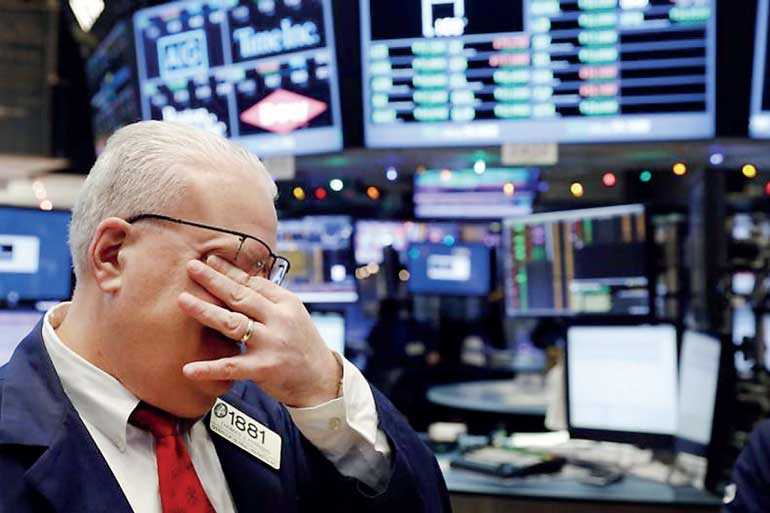Tuesday Feb 24, 2026
Tuesday Feb 24, 2026
Monday, 4 June 2018 00:00 - - {{hitsCtrl.values.hits}}

A trader works on the floor of the New York Stock Exchange (NYSE) shortly after the opening bell in New York, NY, U.S. REUTERS
London (Reuters): Global investors cut their equity holdings to a nine-month low in May after a turbulent month characterised by revived trade war fears, Italian political turmoil and a spike in US bond yields. The Reuters monthly asset allocation poll of 52 wealth managers and chief investment officers in Europe, the United States, Britain and Japan was carried out between 14 and 31 May.
In May, investors were whipsawed by a series of broad-based sell-offs triggered by renewed US protectionist threats, US President Donald Trump’s comments on a possible summit with North Korea, and fears of a euro zone crisis as anti-establishment parties in Italy tried to form a government.
Global equities look set to end the month in the black, but are now 7% below January’s record highs.
A huge bond and equity sell-off in Italy also sent the euro to multi-month lows as investors fear a eurosceptic government could put Italy’s euro zone membership in question, while more stress in the banking sector could ultimately crimp euro zone growth.
Overall equity exposure fell by 1 percentage point to 47.4%, the lowest since August 2017, while bond holdings rose by 1.2 percentage points to 40%, the highest since October 2017.
DEEP DIVISIONS
Although most participants completed the poll before the crisis in Italy escalated, several managers identified it as a potential problem.
Among them was Bordier & Cie UK Chief Investment Officer Mark Robinson, who warned that the formation of an anti-establishment government could prove to be a catalyst for increased market volatility.
“Unless the new government’s wings are clipped, the risks of deep divisions developing within the euro zone, and investors taking flight, could increase,” he said.
Within their equity portfolios, investors stuck with euro zone stocks, raising allocations slightly to 20.6%, the highest since September 2017.
Japanese equity holdings also rose to 19.1%, the highest level in just over two years. Generali Investments Head of Multi-Asset Cedric Baron said the Japanese economy was gaining traction thanks to “dynamic private consumption”, while earnings were also supportive.
Asset managers trimmed their emerging market stocks exposure to 12.8% from last month’s 13.5%, but raised their emerging bond holdings to 11% from 10.4%.
Emerging markets had a torrid month, with the Argentine peso and Turkish lira coming under sustained selling pressure as US 10-year Treasury yields climbed above 3% to a seven-year high. Central banks in both markets had to hike rates to put a floor under their freefalling currencies.
SPILLOVER RISK
But, 61% of poll participants who answered a specific question on emerging markets said they had not reduced their exposure in light of the recent upheaval.
“The wobble in EM assets is no cause for alarm,” said J. Safra Sarasin Investment Strategist Jan Bopp, although he added investors should become more selective given the vulnerability of those countries with large external borrowing needs.
Robeco Strategist Peter van der Welle was among those moving to a neutral EM local currency debt position from a previous overweight. He warned that “spillover risk” within EM currencies had increased at the margin with overseas investors waking up to renewed dollar strength and possible credit rating downgrades.
US 10-year yields retreated to 2.8% at month-end as the Italian crisis prompted a flight to safety. In the poll, US bond holdings rose by 1.8 percentage points to 37.8%, the highest since June 2017.
A slim 56% majority of poll participants who answered a question on US Treasuries said they would not be buyers of the 10-year at yields above 3%.
Several, including Tavistock Wealth Chief Investment Officer Christopher Peel, said the 10-year was likely to sell off much further from present levels, and yields would need to rise to 4% before longer-term buyers returned to the market.
The dollar index surged to a six-and-a-half-month high in May after the Italy crisis battered the euro, but an overwhelming 92% of those who answered a question on the resurgent greenback said they had not changed their year-end forecast.
WHIreland Wealth Management Chief Market Strategist Michael Ingram said the re-rating in the dollar since mid-April was expected. Although there could now be a period of consolidation, he added: “A continued widening in interest rate differentials is likely to prove attractive, particularly if European politics and softening macro momentum continue to undermine euro longs.”